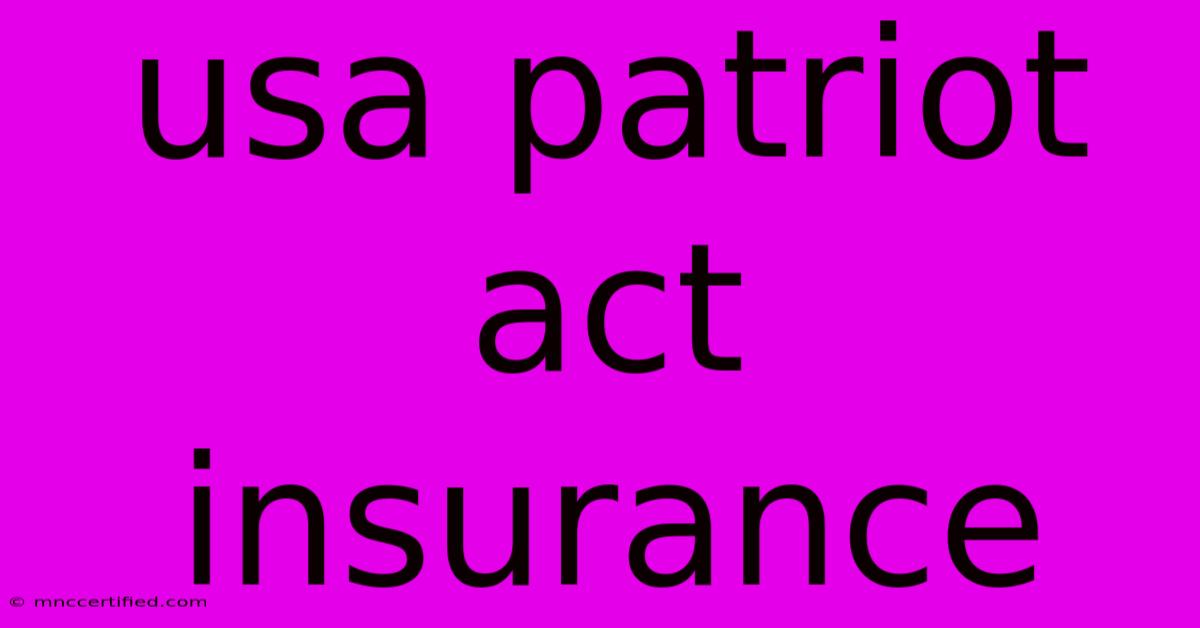Usa Patriot Act Insurance

Table of Contents
USA PATRIOT Act and Its Impact on Insurance: A Comprehensive Guide
The USA PATRIOT Act, officially the Uniting and Strengthening America by Providing Appropriate Tools Required to Intercept and Obstruct Terrorism Act of 2001, significantly altered the landscape of national security and, indirectly, the insurance industry. While not directly regulating insurance, the Act's provisions have created new challenges and responsibilities for insurers regarding anti-money laundering (AML) and know your customer (KYC) compliance. This article delves into the intersection of the PATRIOT Act and the insurance sector, exploring its implications and the steps insurers must take to comply.
Understanding the USA PATRIOT Act's Relevance to Insurance
The PATRIOT Act's main goal was to enhance national security measures in the wake of 9/11. Key provisions relevant to insurance include:
-
Section 312: This section mandates financial institutions, including insurance companies, to establish anti-money laundering programs. This involves identifying and reporting suspicious activity related to potential terrorist financing or money laundering. This is crucial for insurers because they handle significant financial transactions. Failure to comply can result in severe penalties.
-
Section 314a: This section addresses the sharing of information between financial institutions and government agencies regarding potential terrorist financing or money laundering. Insurers must cooperate with law enforcement investigations and share relevant customer data when legally required. This necessitates robust data management and security protocols.
-
KYC Compliance: While not explicitly stated in the PATRIOT Act, the underlying principle of KYC is implicitly required for effective AML compliance. Insurers need to verify the identity of their customers and understand their business activities to mitigate the risk of involvement in illicit activities.
Practical Implications for Insurance Companies
The PATRIOT Act's implications for insurance companies are multifaceted:
1. Enhanced Due Diligence and Customer Verification:
Insurers must implement stringent customer due diligence (CDD) procedures. This includes verifying customer identities, understanding their source of funds, and scrutinizing transactions for any suspicious patterns. This often involves utilizing advanced technologies such as identity verification platforms and transaction monitoring systems.
2. Robust Anti-Money Laundering Programs:
Developing and maintaining a comprehensive AML program is paramount. This includes:
- Risk assessment: Identifying potential vulnerabilities within the insurance operations.
- Internal controls: Implementing policies and procedures to detect and prevent money laundering.
- Employee training: Educating staff on AML regulations and procedures.
- Suspicious activity reporting (SAR): Promptly filing SARs with the Financial Crimes Enforcement Network (FinCEN) when suspicious activity is detected.
3. Data Security and Privacy:
Handling sensitive customer data necessitates robust data security measures. Insurers must comply with data privacy regulations, such as the Gramm-Leach-Bliley Act (GLBA), while simultaneously fulfilling the information-sharing requirements of the PATRIOT Act. This requires a delicate balance between security and transparency.
Penalties for Non-Compliance
Failure to comply with the PATRIOT Act's provisions can lead to significant consequences for insurance companies, including:
- Heavy fines: FinCEN can impose substantial financial penalties for violations.
- Criminal prosecution: In severe cases, individuals and companies can face criminal charges.
- Reputational damage: Non-compliance can severely damage an insurer's reputation and erode customer trust.
- Loss of business: Regulatory action can lead to the loss of licenses and business opportunities.
Staying Compliant: Best Practices for Insurers
To ensure compliance with the USA PATRIOT Act, insurance companies should:
- Regularly review and update their AML programs: Regulations and risks evolve, so programs need to be dynamic.
- Invest in technology: Utilize advanced AML software and tools to enhance detection capabilities.
- Provide comprehensive training for employees: Staff must understand their roles and responsibilities in AML compliance.
- Maintain thorough documentation: Keep accurate records of all compliance efforts.
- Seek expert advice: Consult with legal and compliance professionals to ensure adherence to regulations.
The USA PATRIOT Act's impact on the insurance industry is significant and ongoing. By understanding its requirements and implementing robust compliance programs, insurers can mitigate risks, protect their businesses, and contribute to national security efforts. Ignoring these responsibilities carries substantial financial and reputational consequences. Proactive compliance is not just a legal obligation; it's a crucial aspect of responsible business practice in the modern era.

Thank you for visiting our website wich cover about Usa Patriot Act Insurance. We hope the information provided has been useful to you. Feel free to contact us if you have any questions or need further assistance. See you next time and dont miss to bookmark.
Featured Posts
-
Al Awarid Cosmetics Trading
Dec 10, 2024
-
Crypto Loko 43 Free Spins
Dec 10, 2024
-
Gnr 2025 Tour Two Uk Dates Confirmed
Dec 10, 2024
-
Assads Wife Back To Uk
Dec 10, 2024
-
Bancorp Insurance La Pine
Dec 10, 2024